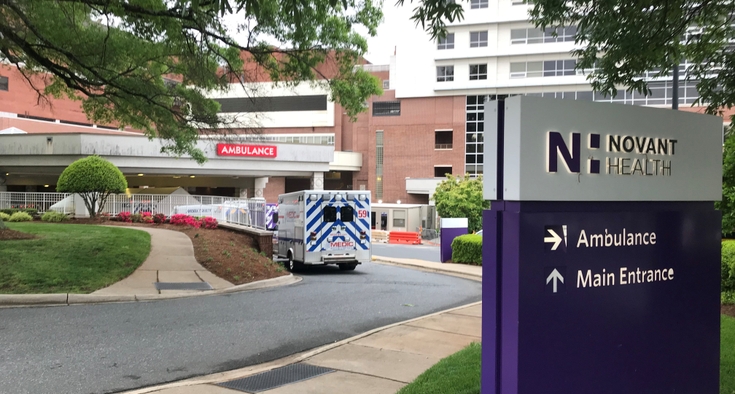Doctors have lately noticed an alarming trend. People are ignoring signs of a heart attack and delaying getting help – because they’re afraid of being exposed to COVID-19. Dr. Mark Mitchell, a cardiologist with Novant Health in Winston-Salem, North Carolina, described that concern as “appropriate,” but also said: “If you’re experiencing chest pains, your biggest risk isn’t COVID. It’s a heart attack.”

“Time is muscle,” he said. The more time that elapses between when patients first feel severe chest pain and when they get medical attention, the more damage is done to the heart muscle. Minutes matter. (The same is true for stroke. The number of people seeking care for stroke is also down considerably. Delaying treatment could mean permanent brain damage. As neurologists say: Time is brain.)
Getting to the hospital within 30 minutes of heart attack symptoms leads to the best outcomes. After 90 minutes, more of the heart muscle has been damaged – sometimes irreparably.
Mitchell has seen a number of patients whose heart attacks were more serious than they might have been. Those patients are in for a longer hospital stay and a slower recovery. The impact of waiting could last a lifetime. Congestive heart failure and death are the most extreme outcomes of putting off a diagnosis and treatment.
“If you’re experiencing chest pain, do not delay,” he said. “Call 9-1-1.”
“When COVID first started raging through the United States, a message was disseminated to the public: Stay away from ERs,” he said. “They have to make room for all the COVID patients. And that was true in cities like New York and New Orleans. But even during a pandemic, people have other health problems.” Also, the vast majority of patients at Novant Health medical centers are not there for treatment of COVID-19.
Ignoring those problems is the worst thing you can do. The most common sign of a heart attack is a tightening in the chest. “Some patients say it feels like an elephant is sitting on their chest,” Mitchell said. Less typical signs – but ones you shouldn’t ignore:
- Shortness of breath
- Nausea
- Jaw pain
- Arm or elbow pain
Novant Health’s ERs have been transformed for the age of COVID-19. There are separate waiting areas for COVID-19 patients and separate treatment rooms, too. Every member of the staff wears a mask. If you’re not already wearing one when you arrive at the hospital, you’ll be given one.
Entire hospitals have been converted to keep the COVID-19 population sequestered.
“Visitors aren’t allowed anymore, which helps cut down on the risk of spread,” Mitchell said. “Ambulances are being thoroughly cleaned between patients. Every precaution is being taken to safeguard patients and staff. Ambulances are being thoroughly sanitized between patients.”
An ER nurse’s perspective

Delays in seeking care by patients who suddenly fall ill fall far-beyond heart atack symptoms. Sarah Drake is an ER nurse at Novant Health Presbyterian Medical Center in Charlotte, North Carolina. She’s accustomed to a nonstop, hectic pace during her shift but said her team is seeing a fraction of the patients they typically treat. And when a patient does come in, he or she has generally waited hours – or even days – because of COVID-19 fears.
“One woman in her 50s came by ambulance with a body temperature of 88,” Drake said. “I’ve never seen a temperature that low in my career. She was diabetic and was about to be put on dialysis. She was lethargic and had been vomiting all day the previous day. She knew she needed medical attention, but COVID scared her into staying home.”
The patient tested negative for COVID, but Drake uses the story to illustrate how dangerous it can be to delay seeking help.
Drake wants people with serious symptoms – chest pain, slurred speech, severe abdominal pain – to know this: It’s imperative to seek medical attention right away. Don’t let COVID-19 keep you from getting urgent care.
Before the coronavirus pandemic, she said, most cardiac patients who came to the ER had been complaining of chest pains for a day or so. Now, she sees some who have had chest pain for a week. Their outcomes are generally much worse.
She gives high praise to Novant Health leaders for ensuring the staff has all the personal protective equipment (PPE) they need. The horrifying PPE shortages that larger cities are experiencing aren’t happening at Novant Health facilities.
Meanwhile, Mitchell has become something of an evangelist for encouraging people with serious medical concerns to get to the ER. He’s not treating COVID-19 patients, but he’s seeing the fallout from people’s fear of it.
“It hurts me as a physician,” Mitchell said, “to know there are things we could have done if only a patient had gotten here sooner.”





